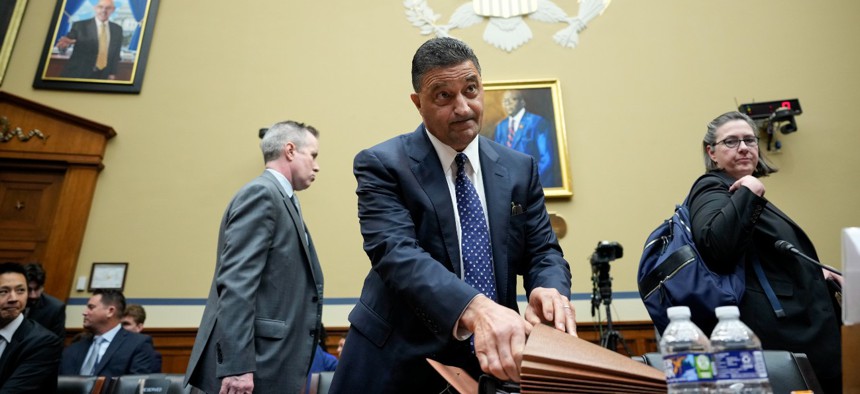
DHS Inspector General Joseph Cuffari arrives for a House Oversight Subcommittee on National Security, the Border, and Foreign Affairs hearing on June 6. Drew Angerer/Getty Images
The DHS Watchdog Says He Deletes Texts. Lawmakers Want to Know If This Violates Records Preservation Laws.
Two lawmakers have also introduced a bill to increase transparency in the Homeland Security Inspector General office.
The embattled Homeland Security watchdog is now under fire for saying on Tuesday that he regularly deletes text messages from his government-issued phone.
During a hearing hosted by the House Oversight and Accountability Committee on Tuesday, Rep. Glenn Ivey, D-Md., ranking member of the House Homeland Security Committee’s panel on Oversight, Investigations and Accountability, questioned Homeland Security Inspector General Joseph Cuffari on his text message practices on his government-issued phone.
“It’s my normal practice to delete text messages,” said Cuffari, who added he is not sure if they are stored anywhere after. He said he uses his government-issued phone, not for personal use, but “to conduct business,” and not official federal business that would be considered federal records under the Federal Records Act. “Therefore I deleted them.” Cuffari didn’t specify what business this was exactly.
Not everyone was convinced of his logic.
Ivey tweeted after the hearing:
Looks like a violation of federal records laws to me. We've got to look into this -- and we will. https://t.co/w4wdWkpVi0
— Rep. Glenn Ivey (@RepGlennIvey) June 6, 2023
Ivey previously asked the chair of his subcommittee for a hearing on the “leadership and performance” of the DHS inspector general. Ivey is not a member of the House Oversight and Accountability Committee and joined Tuesday’s hearing as a guest.
During his closing statement, Rep. Robert Garcia, D-Calif., ranking member for the oversight committee’s panel on National Security, the Border and Foreign Affairs, said he was “extremely concerned” about Cuffari’s statement in front of the committee that oversees the Federal Records Act, which governs how records should be preserved, and what qualifies as a record.
According to a report released later on Tuesday by nonprofit Project on Government Oversight, “staff within [Cuffari's] office have known of the practice for months.” The nonprofit has made many allegations of wrongdoing against Cuffari and has been calling for him to resign.
Also, “according to two sources, Cuffari informed personnel that he had deleted texts from his government phone as they were attempting to collect copies of records responsive to POGO’s Freedom of Information Act lawsuit,” the nonprofit said. “POGO’s sources said Cuffari’s deletion of texts was not reported to the National Archives and Records Administration, as legally required, despite a written recommendation by a federal attorney to report the matter. Finally, the sources said, an internal plan within the Office of Inspector General to investigate his deletion of texts was not carried out."
In reference to this report, Democrats on the House Homeland Security Committee tweeted:
It is clear this needs to be fully investigated.https://t.co/2Psa2P73g2
— House Homeland Security Committee Democrats (@HomelandDems) June 6, 2023
The DHS IG office did not respond for comment on the assertions in the POGO report.
When asked for comment on this situation, the National Archives and Records Administration pointed to the 2014 update to the Federal Records Act to include electronic messages and a NARA bulletin issued to agency heads on January 5 with expanded guidance on how to manage electronic messages, such as texts.
“When text messages sent or received on government phones are determined to be records as defined by the Federal Records Act, they must be managed according to NARA’s regulations and guidance,” the statement said. As for the situation with the DHS inspector general, “we are inquiring further with DHS on this matter.”
DHS told Government Executive in a statement on Thursday: “DHS follows governmentwide requirements for records management, including the Federal Records Act. For additional information about the OIG and the Inspector General's testimony, we refer to the OIG," when asked about the situation.
The text message issue was one of many Democratic that lawmakers brought up as they went after Cuffari, who has been in this role since July 2019, during the hearing. Other concerns included allegations that his office mishandled investigations into missing Secret Service text messages from Jan. 6, 2021. Republicans often defended him.
In a related development, Ivey and Rep. Bennie Thompson, D-Miss., ranking member of the House Homeland Security Committee, introduced a bill on Tuesday aimed at increasing transparency of the DHS inspector general office. The office’s management challenges predate Cuffari: the Government Accountability Office said in a June 2021 report there were widespread management and operational challenges at the office from at least fiscal 2015 to fiscal 2020.
The bill would require the DHS IG office to publish reports that substantiate whistleblower retaliation or allegations of misconduct by a Senior Executive Service member or political appointee at DHS (something the office stopped doing in 2020); report to Congress on any audits, inspections or evaluations that were delayed or terminated; give Congress data on the number and type of tips and complaints the IG’s hotline receives; and submit to Congress a report on the IG’s policies and procedures on quality auditing standards, which GAO will review.
This article was updated on June 8 with comment from DHS.







